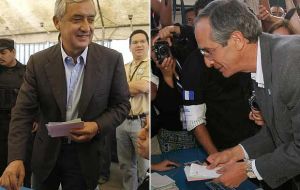MercoPress. South Atlantic News Agency
Guatemala Needs Electoral Runoff
 Perez and Colom to meet in a Nov. 4 runoff
Perez and Colom to meet in a Nov. 4 runoff A center-left businessman and a conservative former general face a November runoff for Guatemala's presidency, according to election returns Monday that showed a Nobel Peace Prize winner finishing a distant sixth.
With 96 percent of the vote counted from Sunday's election, businessman Alvaro Colom, a three-time presidential contender of the center-left National Unity of Hope Party, had 28 percent of the vote. Otto Perez, a former general from the conservative Patriot Party had 24 percent. Nobel Laureate and Mayan activist Rigoberta Menchu trailed in sixth place with 3 percent, according to Guatemala's Electoral Tribunal. Colom and Perez were well ahead of the 12 other candidates, but with no outright majority for either, they will meet in a Nov. 4 runoff. Calm mostly prevailed during the election, though minutes before polls closed, about 3,000 people set a voting booth on fire and burned ballots in the town of El Cerinal, accusing the mayor of bringing in people from neighboring El Salvador to vote. The national campaign was marred by the deaths of about 50 candidates, party activists and their family members. Voting took place under the watch of more than 34,000 police and soldiers. Analysts say security was the most pressing issue in the election. Menchu, who trailed in public opinion polls throughout the campaign, accused the political establishment of sowing fear of a president from Guatemala's poor Mayan Indian population. But on Sunday, she adopted a more conciliatory tone and said she was "very content at the end of the campaign." Menchu is the first Mayan woman ever to run for president in this country, where 42 percent of the population is a descendant of the ancient Mayan civilization. She won the Nobel Peace Prize in 1992 for her human rights work following Guatemala's brutal civil war that killed 200,000 people. Guatemala is Central America's most violent country, with more than 5,000 homicides per year. The country of 12 million is also a corridor for Colombian cocaine heading to the United States, and home to rampant corruption and a culture of violence left over from the 1960-1996 civil war. Perez, who has fought off allegations of a tarnished human rights record from the civil war era, promises a "firm hand" on crime: hiring more police officers, using the military to fight drug gangs and instituting the death penalty. Increased security will attract investment, he says â€" creating badly needed jobs in a country where 51 percent of the population lives on less than US$2 (euro1.50) a day. Colom worked with war refugees in isolated highlands. He proposes increasing social spending to fight poverty and boost employment, and overhauling the judicial system. Voters also were choosing 158 national legislators and 332 mayors. At least half of 6 million registered voters turned out Sunday, according to Guatemala's Electoral Tribunal




Top Comments
Disclaimer & comment rulesCommenting for this story is now closed.
If you have a Facebook account, become a fan and comment on our Facebook Page!